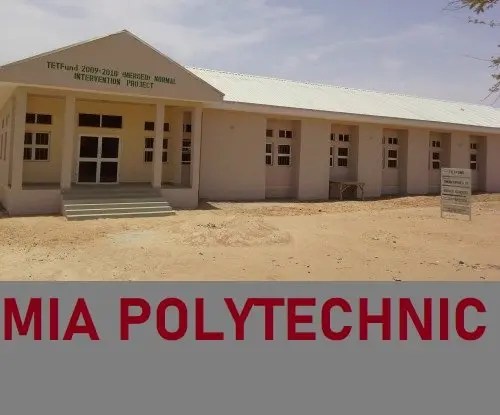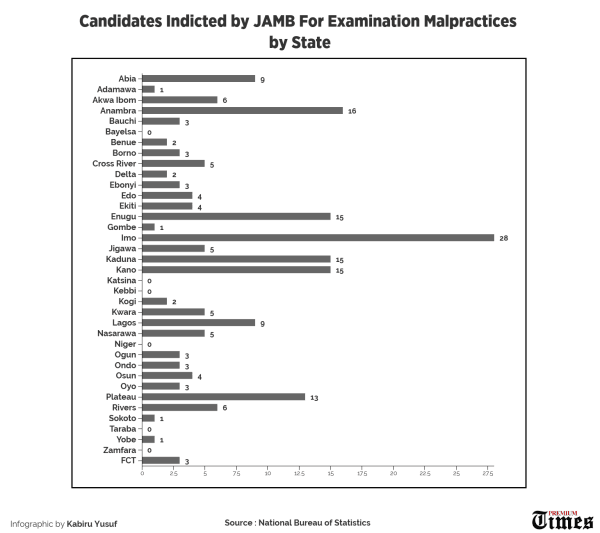
For JAMB, the reasons adduced for adopting CBT fully in the conduct of UTME is that it would completely curb examination malpractices as well as eliminate result blackout. Again JAMB believes CBT will provide candidates’ with immediate results as well as ensure precise ability estimation.
The Joint Admissions and Matriculations Board(JAMB)has achieved another great feat by releasing the 2014 national cut-off points for admissions into Universities, Polytechnics and Colleges of Education, nationwide.
For those with aspiration to go for University education they must score minimum of 180 at the recently concluded Unified Tertiary Matriculation Examination (UTME) while Polytechnics and Colleges of Education (COE) candidates must attain at least 150 to qualify for admission.
These entry points were arrived at, after the 5th Combined Policy meeting on admissions into tertiary institutions at the headquarters of the National Universities Commission (NUC).
Similar Posts:
As a usual phenomenon in Nigeria, candidates who applied for degree awarding institutions or universities totaled 1,584,348 representing 97.070, NCE applicants 25,767 representing 1.579, National Diploma (ND) a paltry 22,072 representing 1.349 while (National Innovation Diploma) NID had just 46 representing 0.003.
This trend keeps one wondering why Nigeria’s educational system has consistently failed to embrace technical education in its quest for industrialisation.
While projects and policies that are on ground indicates that the Federal Government has made considerable efforts to boost access to tertiary education, especially with the establishment of additional 12 new federal Universities in each of the geo-political zones of the country, some other parastatals within the education ministry were instrumental in making these efforts possible and worthwhile.
One of such agency of government is the Joint Admissions and Matriculations Board (JAMB) whose mandate is to conduct the entry level examinations for these tertiary institutions.
Prior to the introduction of the concept of using e-platforms or computers for the conduct of public examinations, examination malpractice in Nigeria had almost attained a frightening proportion, with some candidates who sat for the O’level exams like the West African Examinations Council (WAEC) or the National Common Entrance Examination deploying sophisticated and mundane means in cheating to the extent of almost institutionalizing it in the school system.
There were situations in the country where parents or guardians dubiously facilitate the writing of public examination for their children just to aid them to score high grades and transit into the next phase of their academic pursuit.
It got so bad not too long ago as a man wrote JAMB’s qualifying examinations for his pregnant wife whose pregnancy was probably at an advanced stage.
Another dimension to cheating in public examinations was the establishment of miracle centres where candidates are promised special centres and arrangements to score 290 or the maximum points for admission.
Also, were cases of candidates contact with spiritualists for magic handkerchiefs to facilitate good scores in examinations and methods of cheating seems endless and problematic for the board and invigilators.
All these, no doubt, may have spurred JAMB to seek alternative and modern ways of resolving these challenging which of course at the onset were not without obvious setbacks.
Some of the initial challenges the Computer Based Test (CBT) had were cases where candidates before the commencement of examination would copy supposedly answers from their cell phones into small sheets of papers, which they hid in secluded parts of their body including their private parts to beat security officers.
At the combined policy meeting earlier mentioned, JAMB authorities gave a rundown of its report in 2014, which of course summed up cases of successes and irregularities during the 2014 UTME.
The report indicated that a good number of candidates’ results were withheld owing to cases of collusion with candidates, examiners and external agents to cheat.
Moreover, others were also withheld by the examination body due to candidates’ disappearance with examination materials, multiple registrations, including cases of impersonation.
In all 8,774 results were seized due to irregularities thus representing 0.5 per cent as against 12,806 seized results in 2013 representing 0.7 per cent.
Efforts by government and stakeholders in the education sector to curtail the ugly trend yielded little results until JAMB came up with its CBT which it plans to institutionalize in the conduct of UTME from 2015.
As it stands, JAMB has phased out Dual Based Test and Paper Pencil Test (PPT) which it previously adopted as options for the CBT.
For JAMB, the reasons adduced for adopting CBT fully in the conduct of UTME is that it would completely curb examination malpractices as well as eliminate result blackout.
Moreover cases of incomplete results will be greatly minimised but above all it would save the board the rigours and challenges of logistics associated with the conduct of the examination simultaneously in all the states of the federation.
Again JAMB believes CBT will provide candidates’ with immediate results as well as ensure precise ability estimation.
JAMB at the moment is however constrained with enough centres hence calls for private sector participation to boost the initiative.
Close observers of the education sector have also come to see the trend of malpractices as steadily fading away as the CBT have come to block all loopholes for cheating.
To further curtail the menace of malpractices, JAMB has decided to invoke the 1999 Examination Malpractice Act which stipulates that any candidate who is involved in any act of examination malpractice would be banned from sitting for the board’s examination for one (1) to three (3) years depending on the gravity of the offence.
In its fight against malpractices, JAMB has also taken measures in the conduct of the examination and admission of candidates into tertiary institutions that all institutions during registration of admitted candidates must request for the presentation of the Board’s admission letter, photo album and biometric data verification.
Presently, there are over 156 well furnished CBT centres nationwide but out of these number, 10 were personally built by the Board.
While commissioning a model centre built at the cost of N154m at Goko-Bwari, Registrar and Chief Executive of JAMB, Professor Dibu Ojerinde lamented that over 98 vehicles were used by the Board in the distribution of the examination materials to the various centres across the states of the federation, a development he noted does not also guarantee the security of the materials.
He said emphatically, “We are phasing out PPT and we are not going back to it anymore. This is the end to PPT in this country. PPT was full of fraud and malpractice; it is full of logistic problems and full of insecurity so we do not want to go back to it. We now have a solution with the introduction of CBT; we are forging ahead with it.”
“Unlike before when we were using the analogue style the new scheme will stop malpractice. CBT ensures that the result of any examination conducted by JAMB is ready within a week, that is the digital revolution that has been introduced by JAMB,” he added.
The Supervising Minister of Education, Nyesom Wike, who commissioned the centre, urged other public examination bodies in the country to take a cue from JAMB for partnership in the conduct of public examinations in Nigeria.
Wike who pledged Federal Government’s assistance to complement the existing centres in the country said, “The JAMB experience is already a model in Africa and has become a national pride which can be proudly be show-cased to the world”.
“It is therefore incumbent that the Board should do everything possible to maintain the standard already set with the introduction of CBT in large scale assessment,” he said. (Daily Independent)




